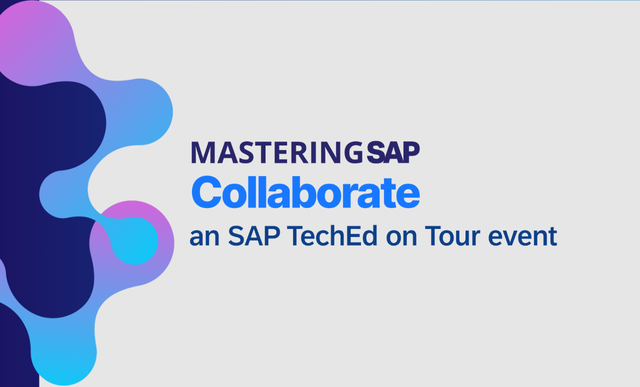SAP MII
Filter By
Browse By
- SAP Analytics and AI
- SAP Application Development and Integration
- All SAP Application Development and Integration
- SAP ABAP
- SAP ABAP Development Tools
- SAP ABAP Test Cockpit
- SAP API Management
- SAP BAPI
- SAP Basis
- SAP BRF
- SAP Business Application Studio
- SAP CMS
- SAP Design Studio
- SAP Development Tools
- SAP DevOps
- SAP EAI
- SAP EDI
- SAP Extension Suite
- SAP Fiori
- SAP Fiori Elements
- SAP Integration Suite
- SAP Low Code Application Development
- SAP Low Code Automation
- SAP Netweaver
- SAP Release Management
- SAP UI5
- SAP Web Application Server
- SAP Web IDE
- SAP Business Process Management
- SAP Center of Excellence
- SAP CIO
- SAP Customer Experience
- SAP Data and Data Management
- All SAP Data and Data Management
- SAP BW
- SAP BW/4HANA
- SAP Crystal Reports
- SAP Data Archiving
- SAP Data Center
- SAP Data Governance
- SAP Data Integration
- SAP Data Migration
- SAP Data Quality
- SAP Data Services
- SAP Data Strategy
- SAP Data Visualization
- SAP Data Warehouse Cloud
- SAP DMS
- SAP Document Control
- SAP EIM
- SAP ETL
- SAP ETL Tools
- SAP HANA
- SAP HANA Administration
- SAP HANA Deployment Infrastructure
- SAP HANA Studio
- SAP Master Data
- SAP Master Data Governance
- SAP MDM
- SAP Enterprise Architect
- SAP Enterprise Asset Management
- SAP ERP
- SAP Finance
- All SAP Finance
- SAP Accounting
- SAP AR AP
- SAP Asset Accounting
- SAP Billing Systems
- SAP BPC
- SAP BRIM
- SAP Cash Management
- SAP Central Finance
- SAP Controlling
- SAP COPA
- SAP Cost Center Accounting
- SAP Currency Risk
- SAP e-invoicing
- SAP FICO
- SAP Finance Automation
- SAP Advanced Financial Closing
- SAP Financial Consolidation
- SAP Financial Planning
- SAP FX Risk
- SAP General Ledger
- SAP Global Tax Management
- SAP Hyperion
- SAP Order to Cash
- SAP Payment Processing
- SAP Profitability Analysis
- SAP Rebate Management
- SAP S/4HANA Finance
- SAP SWIFT Compliance
- SAP Treasury Management
- SAP Universal Journal
- SAP Governance Risk and Compliance
- SAP Human Capital Management
- SAP Intelligent Technologies
- SAP Platform and Technology
- All SAP Platform and Technology
- SAP Business Technology Platform
- SAP Cloud
- SAP Cloud Connector
- SAP Cloud Integration Platform
- SAP Cloud Migration
- SAP Cloud Platform
- SAP Cloud Providers
- SAP Cloud Strategy
- SAP Digital Signature
- SAP Container Platform
- SAP HANA Enterprise Cloud
- SAP Digital Asset Management
- SAP Smart Forms
- SAP HEC
- SAP Digital Integration Hub
- SAP Hyperscalers
- SAP Infrastructure
- SAP Messaging
- SAP Quality and Testing
- SAP Security
- SAP Spend Management
- SAP Supply Chain Management
- All SAP Supply Chain Management
- SAP APO
- SAP Asset Management
- SAP Business Network
- SAP Digital Manufacturing Cloud
- SAP Digital Twin
- SAP EWM
- SAP IBP
- SAP Inventory Management
- SAP Label Printing
- SAP Logistics
- SAP Manufacturing
- SAP Manufacturing Automation
- SAP MES
- SAP MII
- SAP MM
- SAP MRO
- SAP MRP
- SAP Order Management
- SAP Plant Maintenance
- SAP PLM
- SAP Production Planning
- SAP S&OP
- SAP SD
- SAP SPM
- SAP Supply Chain Planning
- SAP Track and Trace
- SAP Transportation Management
- SAP System Administration
MII Defined
Manufacturing integration and intelligence (MII) is an application to synchronize manufacturing operations with back-office business processes and standardized data. It is a data hub between ERP and operational applications that is a workflow to identify problems in production performance. The Internet of Things (IoT) provides intelligence and visibility in real time to tightly integrate manufacturing and operations. MII provides analytics and analysis to review overall equipment effectiveness (OEE).
The main components of MII are on-premise and private cloud deployment, predefined content integration with SAP S/4HANA, local and central KPIs for equipment effectiveness, and in memory big data analysis.
MII Defined
Manufacturing integration and intelligence (MII) is an application to synchronize manufacturing operations with back-office business processes and standardized data. It is a data hub between ERP and operational applications that is a workflow to identify problems in production performance. The Internet of Things (IoT) provides intelligence and visibility in real time to tightly integrate manufacturing and operations. MII provides analytics and analysis to review overall equipment effectiveness (OEE).
The main components of MII are on-premise and private cloud deployment, predefined content integration with SAP S/4HANA, local and central KPIs for equipment effectiveness, and in memory big data analysis.
SAP Manufacturing Integration and Intelligence (SAP MII)
Key Capabilities of SAP MII include:
- Centralized Plant Information: View of plant resources with a catalog to arrange shop floor assets in a hierarchal structure, maintain master data, and incorporate information from sensors and business users.
- Streamlined Energy Monitoring and Analysis: Simplify the analysis of energy resources across the plant information catalog, from buildings to manufacturing networks.
- Enhanced Overall Equipment Effectiveness: Identify the root causes for equipment down time, efficiency loss, and low quality on various hierarchy levels by viewing them in a business context.
- Focused Manufacturing Analytics: Increase insights with in-memory platform for cross-data store analysis, statistical process control, predictive analytics, and storage for big data.
- Customized User Information: Role-based production data on desktop or mobile device with dashboards.
- Integrated Business Processes: Connect intelligent business processes to production and extend integration to device connections.
Benefits are:
- Increased OEE to identity equipment down time.
- Integration between the shop floor and ERP applications.
- Process orchestration of quality management processes by specific customers.
- Platform universality for rapid adoption by other manufacturing processes.
Vendor partners to support your manufacturing digital intelligence include: Pillirio, Dataxstream, and SAP.
Key Considerations for SAPinsiders are:
- Lion Improves Levels of Integration and Automation with SAP Manufacturing Integration and Intelligence (SAP MII). Read the case study about how Lion improved manufacturing automation in its plants.
- Sappi Limited Gains Real-Time Visibility into Production Costs with SAP MII. Review this article to see how improvements in efficiency were made by consolidating data across multiple manufacturing systems.
6 results
-

Leveraging Technology to Address Automotive Industry Challenges
Reading time: 5 mins
By Kumar Singh, Research Director, Automation & Analytics, SAPinsider Automotive- An industry prone to challenges The automotive industry is one of the most prominent industries in the world of manufacturing. Cassia and Matteo quote in their bestselling book “The Economics of Cars”: “The history of the manufacturing industry and the history of the automotive industry…
-

- SAP MII
 Premium
Premium
Lion Improves Levels of Integration and Automation with SAP Manufacturing Integration and Intelligence (SAP MII)
Reading time: 5 mins
This research brief examines how Lion improved automation and IT/OT integration in its manufacturing plants. In Lion’s case, the company digitized and automated a manufacturing plant in New Zealand, but a best of-breed strategy for all their enterprise solutions had left them with dozens of different IT solutions and a complicated organic IT architecture that…
-

- SAP MII
 Premium
Premium
Sappi Limited Gains Real-Time Visibility into Production Costs with SAP MII
Reading time: 8 mins
Sappi Limited has grown to become a leading global producer and supplier of dissolving wood pulp, paper pulp, and paper products — with an expanded system landscape to match. Its Southern Africa division recognized an opportunity to improve efficiency by consolidating the data spread across its multiple manufacturing systems. Learn how Sappi Southern Africa used…
-
-

- SAP MII
 Premium
Premium
How to Integrate Enterprise Systems and an MES Using SAP MII
Reading time: 31 mins
Learn how to develop a composite application in SAP Manufacturing Integration and Intelligence (SAP MII) by mashing up data from ERP and a manufacturing execution system (MES). See how to leverage message services and business logic services for ERP and MES integration. Key Concept The information required for manufacturing execution may come from different systems...…
-

- SAP MII
 Premium
Premium
How to Use Manufacturing Data Objects to Develop Composite Applications in SAP MII
Reading time: 18 mins
Organizations often come across situations while implementing a solution using SAP Manufacturing Integration and Intelligence (SAP MII) in which they want to store the relevant data and persist it locally in the SAP MII system. One reason is that data comes from many systems, and you can save this combined data in SAP MII and...…
-

- SAP MII
 Premium
Premium
What You Need to Know About SAP xMII to Enable Adaptive Manufacturing
Reading time: 13 mins
Learn about SAP xApp Manufacturing Integration and Intelligence (xMII) and see how you can use it to improve your manufacturing processes. Through several real-world examples, see how xMII helps your operation monitoring and control, quality management, and manufacturing synchronization. Then, take a look at the technology behind xMII. Key Concept SAP xApp Manufacturing Integration and...…
Become a Member
Unlimited access to thousands of resources for SAP-specific expertise that can only be found here.
Become a Partner
Access exclusive SAP insights, expert marketing strategies, and high-value services including research reports, webinars, and buyers' guides, all designed to boost your campaign ROI by up to 50% within the SAP ecosystem.
Upcoming Events
-

Mastering SAP Collaborate, an SAP TechEd on Tour event
November 12 - 14, 2025
Sydney, New South Wales
Australia
View Event
Related Vendors
Your request has been successfully sent

